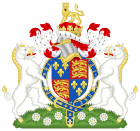Titulus Regius facts for kids

|
|
| Dates | |
|---|---|
| Royal assent | 1484 |
| Repealed | November 1485 |
|
Status: Repealed
|
|
Titulus Regius means "royal title" in Latin. It was a special law passed by the Parliament of England in 1484. This law officially made Richard III the King of England.
This act confirmed what important people, like the Lords and members of the House of Commons, had said a year earlier. They had declared that the marriage of King Edward IV of England to Elizabeth Woodville was not valid. This meant their children, including Edward, Richard, and Elizabeth, were considered illegitimate. Because of this, they could not inherit the throne. Richard III was then announced as the true king.
However, there were doubts about this declaration because the Lords and Commons had not met as a proper parliament. So, when Parliament finally met, they passed Titulus Regius to make Richard's claim to the throne a legal act. After Richard III was defeated and died, this law was cancelled. This made Edward IV and Elizabeth Woodville's children legitimate again.
Why Richard III Became King

The Titulus Regius law said that King Edward IV's marriage was not valid. This was because a bishop named Robert Stillington claimed that King Edward had already promised to marry another woman, Lady Eleanor Butler, before he married Elizabeth Woodville.
The document also made a serious accusation. It claimed that Elizabeth Woodville and her mother had used magic to make the king marry her. This was a way to make her marriage seem even more wrong.
Richard's brother, George, Duke of Clarence, had been executed earlier. His family had lost their rights to the throne. This meant that Richard was the next in line. The law also suggested that Edward and George were not truly legitimate. It pointed out that Richard was "born within this land" and was the "undoubted son and heir of Richard, late Duke of York."
The law also criticized Edward IV's time as king. It said he was too focused on pleasure and easily influenced by bad people. This was a hidden message about the Woodville family. In contrast, the law praised Richard. It said he was very smart, wise, fair, brave, and had done many good things in battles.
How the Law Was Cancelled
After Richard III was killed in battle, the new king, Henry VII, cancelled Titulus Regius. This happened during Henry VII's first parliament. Cancelling this law was very important. Henry VII and his supporters believed Richard III had taken the throne unfairly. Also, Henry VII had promised to marry Elizabeth of York. She was the oldest daughter of Edward IV and Elizabeth Woodville. Titulus Regius had made her illegitimate, so cancelling it made her a rightful princess again.
Henry VII also ordered everyone to destroy all copies of Titulus Regius and any related papers. He told them not to read them first. His orders were followed so well that for a long time, only one copy of the law was known to exist. A monk had copied it into a book called the Croyland Chronicle. Sir George Buck found it more than a century later, during the time of King James I.
The law that cancelled Titulus Regius said that the original law was "void, annulled, repealed, invalid, and of no force or effect." It also said that the original document should be destroyed. Any copies had to be destroyed or returned to Parliament. If not, people could face fines and jail time.
A legal report from that time said that the law should be "annulled and utterly destroyed." It also said it should be "taken out of the Roll of Parliament, and be cancelled and burned, and be put in perpetual oblivion."
Henry VII almost completely succeeded in hiding Titulus Regius. For about 100 years, during the time of the Tudor dynasty, this law was kept secret. People knew that Richard had claimed Edward's sons had no right to the throne because of a marriage promise. But they did not know who Edward's supposed "real" wife was. For a long time, people like Thomas More thought the law was talking about Edward's long-time girlfriend, Elizabeth Lucy. This idea was believed until George Buck found the original document.
Even though Titulus Regius tried to say Edward IV's first son was not a true king, he is still counted as Edward V. This helps to show that Richard III was seen as someone who took the throne unfairly. Because of this, Henry VII's grandson was named Edward VI.
See also
- The Daughter of Time, a book from 1951 by Elizabeth MacKintosh (who wrote as Josephine Tey).
- Act of Accord (1461)

